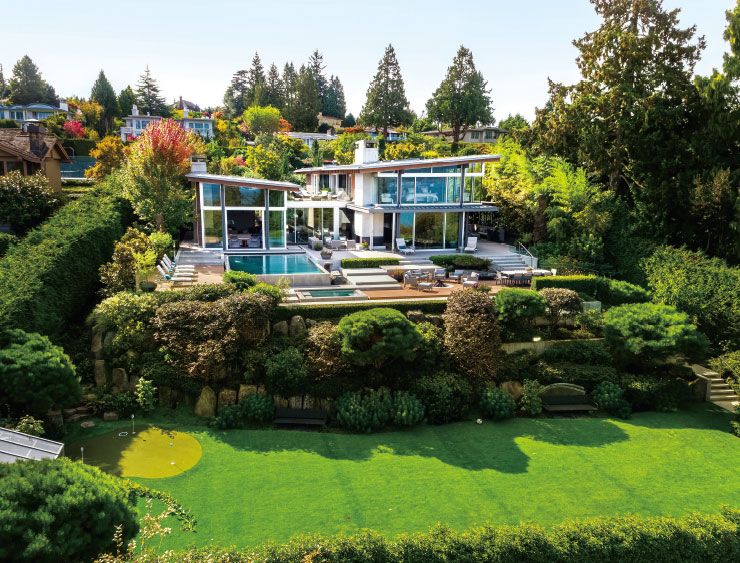
Words Lisa Manfield x Photography Alena Machinskaia
One of Vancouver’s priciest homes is a cosy, livable nest that integrates natural west coast elements.
One of Vancouver’s priciest — and most artfully designed — properties is on the market. But despite its lavish location, the owners and design team opted for approachability over opulence, creating a cosy, livable nest that integrates natural elements of west coast life.
Quintessential Vancouver architecture often reflects its environment, bringing what we love most about the west coast inside. Case in point: every glass-wrapped building that reflects water views and overcast skies while welcoming in natural light and urban viewscapes.
And given how much Vancouverites prize their ocean, their forests, their spectacular sunsets, it makes sense that we gravitate toward such architectural efforts to bring the outside in. Still, Garret Werner has taken this aspiration to epic heights in designing Pacific Spirit Estate, a 0.7-acre ocean-view property located on the University Endowment Lands at UBC.
Originally designed for a young family of four, and currently on the market exclusively through Faith Wilson Group Christies International Real Estate, the home, built in 2014, brings natural elements together in an integrated sense of quiet fluidity.
“I have a holistic view on design,” says Garret, of Garret Cord Werner Architects and Interior Designers. “Interior and landscape need to be composed as one vision. In creating this home, we really had to do a lot with the land that was there. They [the client] wanted it to feel integrated into the landscape, while a lot of homes feel like they’ve been dropped from outer space.”
Working with builder Darren Werner (Garret’s brother) of Werner Construction, and Ron Rule, who did the landscape plantings, Garret cleared the entire 100- by 300-foot property, which originally contained a traditional 1940s home on an overgrown lot with a 44-foot vertical drop, to reshape the landscape for his vision.
“The key about sculpting the architecture into the landscape is to create a journey,” he says.
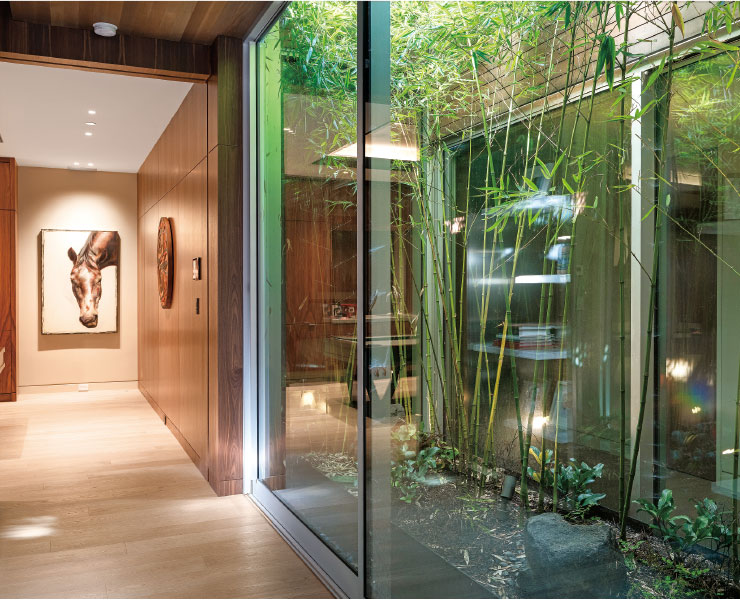
Parking spaces: 8 (3 covered) Fireplaces: 5
Structured Distinction
The journey Garret created at Pacific Spirit Estate begins the moment you open the gate. The driveway winds around in a semicircle, slowly revealing the 10,139-square-foot south-facing residence that seemingly glows below — all windows and water and steel and light-brown wood. A waterfall gently tumbles to the right, flowing underneath the driveway.
Meanwhile, the three-car garage, which is separate from the house, is cleverly hidden at the end of the driveway.
“We didn’t want it to be something you saw right away,” Garret says. “We created a driveway that rolls on top of it and wraps around to it on a lower level to make the property feel more approachable.”
At the entranceway, a second waterfall plummets soothingly into a large koi pond, fostering a sense of tranquility and reflection.
“When you come through the entrance, you come down the stairs, you walk over bridges, you feel water underneath your feet, you come down further and you have an outlook,” Garret says. “You see right through the building.”
That’s because the home itself consists of two pavilion-like buildings joined together by a central, formal dining room revealed by the floor-to-ceiling windows.
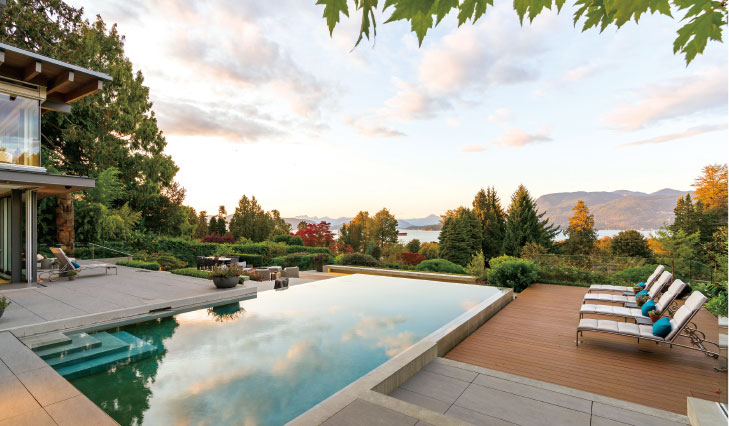
games lawn, garden tea house.
“I love a home that has different zones,” Garret says. “A typical residence is one block but we like to break a home apart. The whole right wing is the entertainment pavilion [with a great room and sitting area adjoining the dining room]. The left is the family kitchen. It gives each area a sense of its own personality and distinction.”
A blackened stainless steel staircase connects all three levels down to the basement, which may be better described as a bright and multi-faceted lower level containing a host of functional and fun zones, including a rec room, toy room, guest suite, gym and change rooms, as well as a gorgeous wine cellar and tasting room.
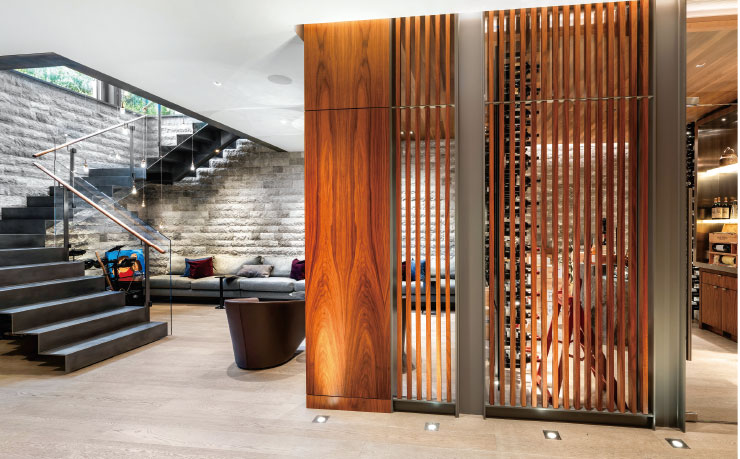
On the upper level, a modest three bedrooms and three bathrooms provide comfortable amenities for a family of four, while a 4,10-square-foot rooftop deck off the master bedroom offers the perfect backdrop for savouring sunsets and morning lattes.
Out back, a perfectly sculpted outdoor living space for the warmer months includes an infinity pool and hot tub, fire pit and outdoor kitchen on the upper level, along with a games lawn and quaint garden teahouse on the lower level.
Essential Elements
But it’s the intricate design elements that truly put the west coast spirit into Pacific Spirit Estate’s unique structure.
True to its city-of-glass foundation, the home is practically see-through, with floor-to-ceiling windows (of the highest efficiency rating for sustainability) — many of which open up completely — bringing north-side views of English Bay and the North Shore Mountains from the back yard through to the front door, as well as lush scents from the surrounding gardens into home offices and living spaces.
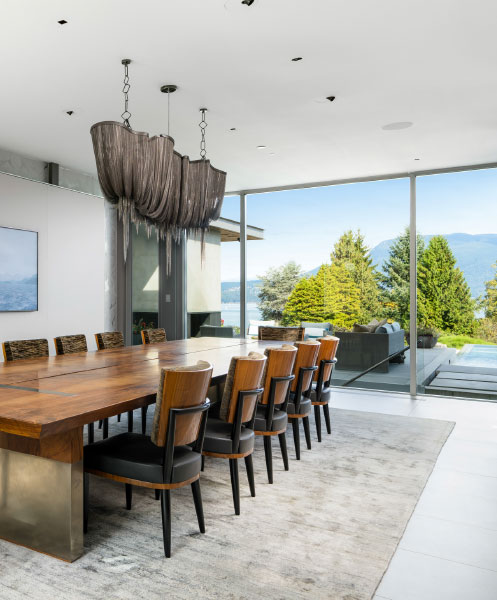
Inside, sustainably harvested wood panel walls and exposed ceiling beams add to the natural feel.
“The raw framework of the building is beautifully put together,” Garret says. “In a traditional home, the framing is inexpensive and covered with drywall. In this case, every part of the home is exposed so the engineering and craftsmanship is far greater.”
In addition to concrete, steel, glass and wood, Garret used rock both inside and outside the home, most notably in the waterfall at the front entrance, as well as the 3,000-pound slab of basalt rock that doubles as a serving table in the wine cellar.
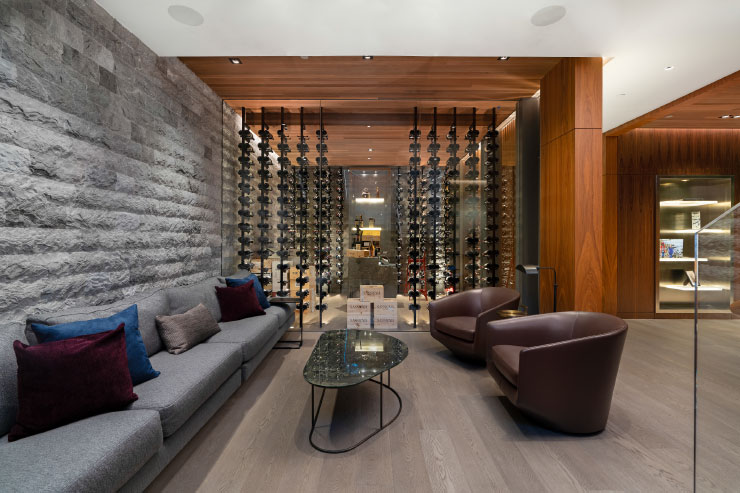
“I always like to bring in rock. It makes the home feel like you’re going on a hike.”
Fused glass walls in the kitchen and dining room enhance the transparency of the place, while a light well channels natural light downward to brighten the basement.
“Light is a big, important factor of our design,” Garret says. “Everywhere you go inside the light just streams in, so it’s quite beautiful.”
Finally, fire rounds out the essential elements with magnificent fireplaces inside and out.
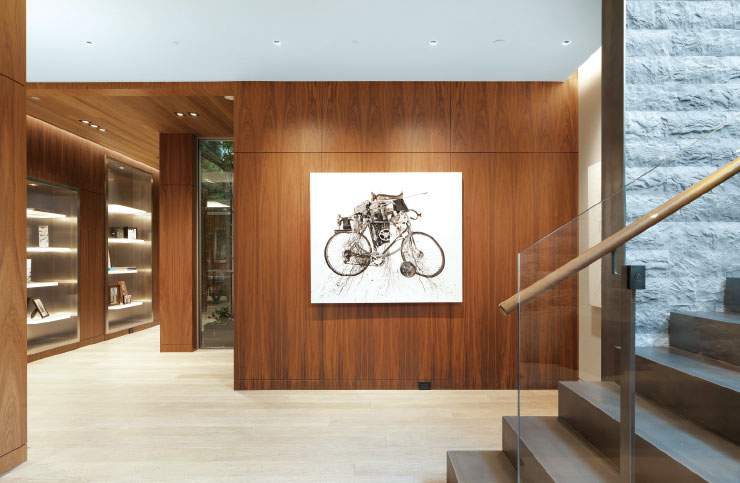
“These are primal gathering spaces,” Garret says, “and the fireplaces have no glass on them. The flames are open just like the good old days. The scale is important. It’s like being in a castle. You feel small in front of it. You feel cozy.”
The light and the warmth transform this space from house to home.
“It’s a place where you want to nest and build memories,” Garret says. “You don’t feel like it’s a museum. For a 10,139-square-foot home, it doesn’t feel ominous. It’s approachable. It’s like living in a resort — your own private resort. You feel like you’re on vacation. I think that appeals to everybody.”

 The Evolution of Self-Improvement
The Evolution of Self-Improvement